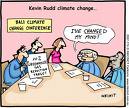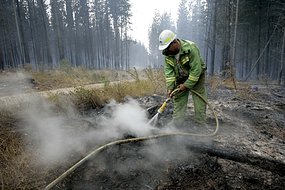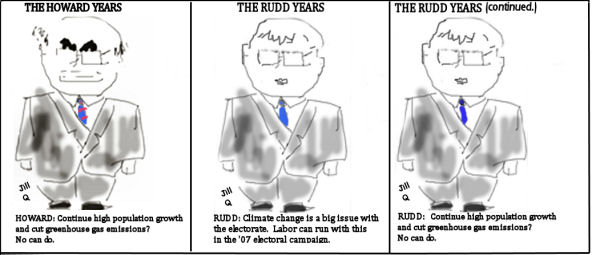Illusions on the edge of a climate precipice

The climate crisis is not a negotiable issue and politicians must
start paying attention to science.

CAN we expect decent climate policy when most of the decision-making elite are ignorant of the real scientific imperatives, or believe they can negotiate with the laws of physics and chemistry? The answer is bleak, judging by the lead-up talks to the climate summit in Copenhagen in December. The conference is slated to sign a new global deal on greenhouse gas reductions, but key players expect failure. British climate economist Lord Nicholas Stern and former UN secretary- general Kofi Annan are among luminaries now saying that no deal is better than a bad deal, while European Commission president Jose Manuel Barroso warns: "If we don't sort this out, it risks becoming the longest and most global suicide note in history."
Climate politics has become a game of chicken, a planet-crippling procrastination driven by short-term concerns and a striving for partisan advantage. Last year, Ross Garnaut wondered if "this issue is too hard for rational policymaking ... the issues are too complex, the vested interests surrounding it too numerous and intense, the relevant time-frames too long". Copenhagen is likely to confirm his dark assessment.

For scientists this is frustrating and depressing, and so more feel compelled to openly enter the political fray. America's best-known climate researcher, NASA's James Hansen, now joins protesters at coal plants and stumps the country in support of the 350.org campaign. This will peak with more than 2000 activities in 150 countries around the globe on October 24.
It's a long way from the politics-free world of the laboratory and peer-reviewed journals, but outside those confined spaces the politics is hard to avoid. In public, scientists are hammered by sceptics, and those on the public payroll find their advocacy regularly restrained by government. And all must choose what part of the vast climate science knowledge-bank they will communicate on any particular occasion.
Some are drawn into making judgments about what may be publicly palatable, concerned by the growing gap between the science and the politics. They want to be relevant and change mindsets, and wonder if they were to spell out the brutal truth - that in Hansen's immortal words, we are "on the edge of a precipice beyond which there is no redemption" - they will not be listened to.
Even the work of the Intergovernmental Panel on Climate Change is conservative, filtered by political considerations: government appointees negotiate and sign off on the summary reports. For two decades, debate has clustered around the politically mediated target of holding global warming to 2 degrees, said to be equivalent to a level of greenhouse gases less than 450 parts per million (ppm). This is the Australian Government's policy, and on Wednesday when some of our leading scientists brief federal members of Parliament, the Government will be looking for a nod towards this target, and for the carbon pollution reduction scheme.
Even the work of the Intergovernmental Panel on Climate Change is conservative, filtered by political considerations: government appointees negotiate and sign off on the summary reports. For two decades, debate has clustered around the politically mediated target of holding global warming to 2 degrees, said to be equivalent to a level of greenhouse gases less than 450 parts per million (ppm). This is the Australian Government's policy, and on Wednesday when some of our leading scientists brief federal members of Parliament, the Government will be looking for a nod towards this target, and for the carbon pollution reduction scheme.
Reporting of evidence given by a number of leading scientists to a Senate inquiry into the scheme in May gave the impression they had given it a tick of approval. Yet in reality it will not reduce Australia's actual emissions below the 1990 baseline for another three decades, instead relying on buying offsets - the antithesis of serious emission-reduction strategies.

The US Government Accounting Office recently concluded that "carbon offsets involve fundamental trade-offs and may not be a reliable long- term approach to climate change mitigation".
The target for industrialised countries to reduce emissions by 25-40 per cent by 2020 is misleading because the IPCC notes that these "emissions reductions … might be underestimated due to missing carbon cycle feedbacks". In fact, the sensitivity of the climate to rising levels of greenhouse gases is likely to double the generally assumed level, a point made by the ANU's Will Steffen in his recent report for the Australian Department of Climate Change.
This means that when long-term effects such as the loss of large polar ice-sheets are taken into account, the Government target of 450 ppm may well produce global warming of about 4 degrees, twice the level considered dangerous by conservative governments.
Even 2-degree warming will take the Earth past significant tipping points. Likely effects include large-scale disintegration of the Greenland and west Antarctic ice-sheets, big sea-level rises, the mass extinction of plant and animal species, dangerous ocean acidification and widespread drought, desertification and malnutrition.
Should this always be an object of unwearied explanation by our scientists, or will political minders always be hassling for a quick media grab about policy "moving in the right direction", so we can move on to other matters, having "fixed" the climate?

It's a grand illusion that that 2 degrees and 450 ppm is a reasonable target. Twenty-nine of the world's leading scientists, including Steffen, have specified that less than 350 ppm of carbon dioxide is a "safe boundary" for the planet, in perhaps the most significant peer- reviewed paper of the year.
Our politicians need to hear this, because they are not taking the actions the science demands. The conventional mode of politics is incremental and fearful of fundamental change and the major parties have adopted a traditional policy approach to the climate problem: something for the environment lobby and something for business.
Our politicians need to hear this, because they are not taking the actions the science demands. The conventional mode of politics is incremental and fearful of fundamental change and the major parties have adopted a traditional policy approach to the climate problem: something for the environment lobby and something for business.
But solving the climate crisis cannot be treated like any other issue, with the demands of each side balanced somewhere in the middle. It is not possible to negotiate with the laws of physics and chemistry. The planet cannot be bought off. There are absolute limits that should not be crossed, and doing something, but not enough, will still lead to disaster.
David Spratt is the co-author of Climate Code Red: The Case for Emergency Action, shortlisted for the 2009 Victorian Premier's Literary Awards.
Originally published in the Age of 19 Oct 09. See also: www.carbonequity.info.






Recent comments